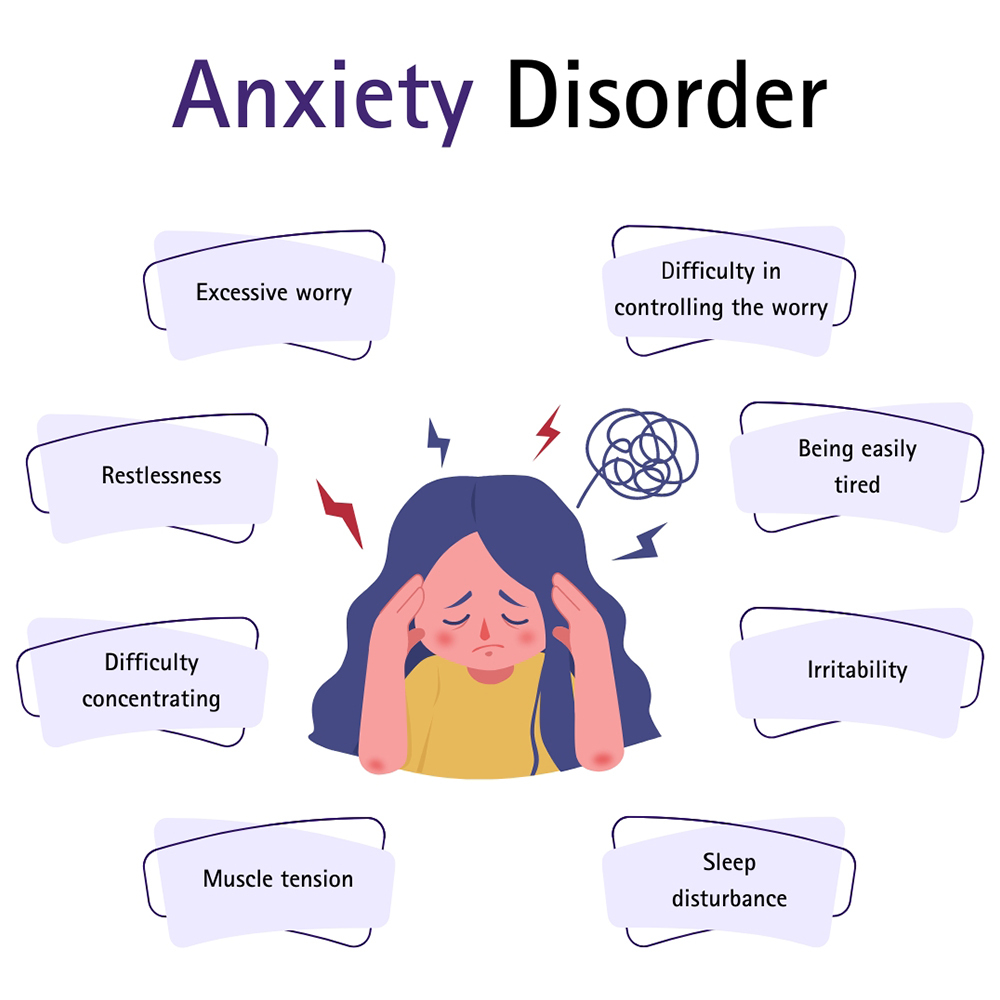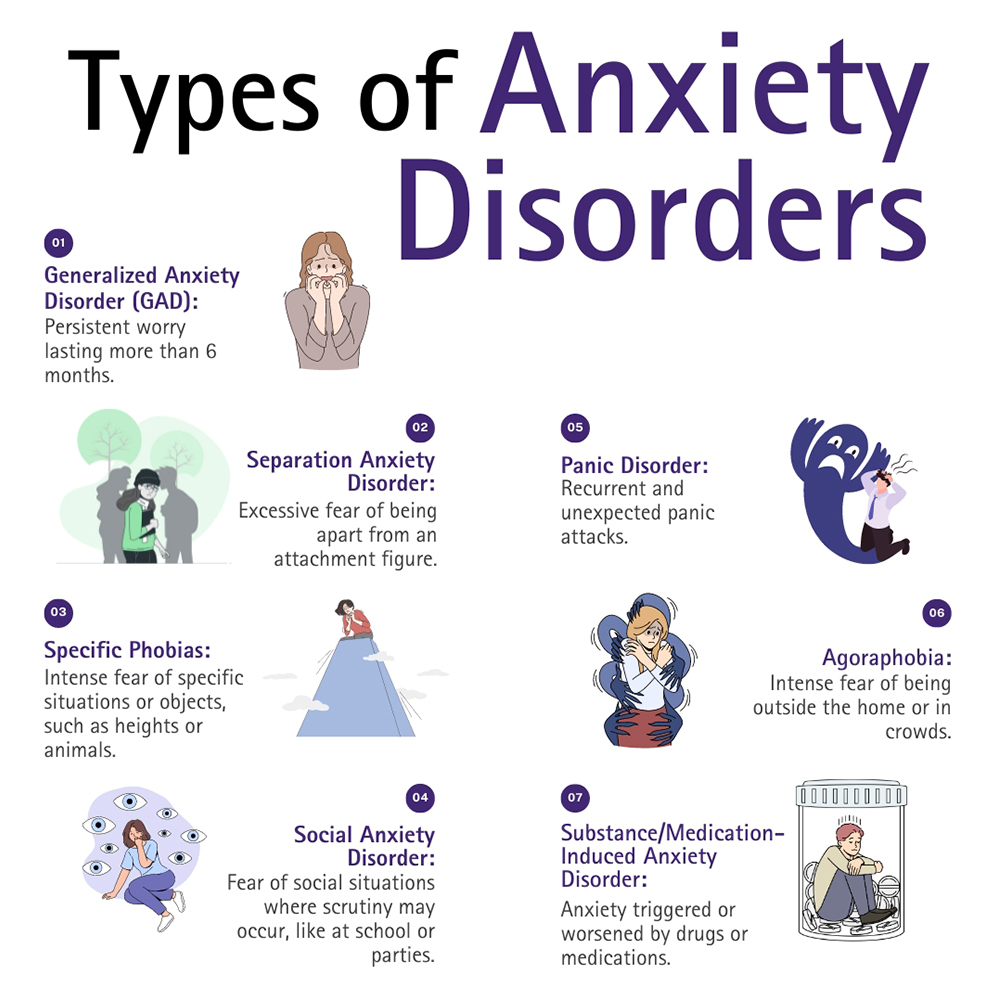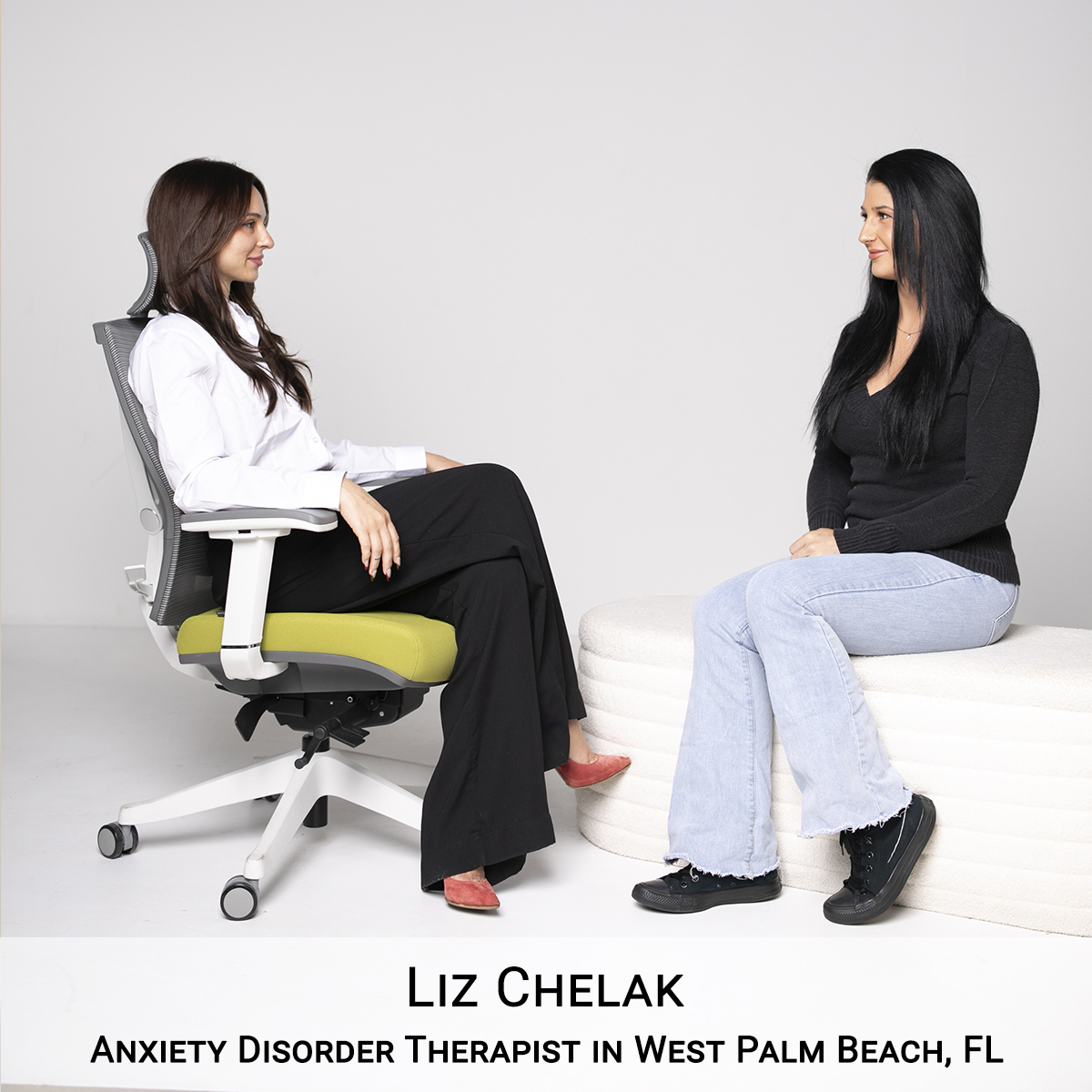What Is an Anxiety Disorder?
Anxiety disorder, or generalized anxiety disorder (GAD), is a mental health diagnosis characterized by excessive worry and fear that disrupt behavior. Fear is usually a response to real danger; however, anxiety is irrational fear or anticipation of a future threat. Anxiety can prevent you from doing things you may need to do or enjoy. People with anxiety disorders overestimate the danger of situations, which causes them to avoid sometimes necessary tasks.
Symptoms of anxiety disorder include:
- Excessive worry
- Difficulty in controlling the worry
- Restlessness
- Being easily tired
- Difficulty concentrating
- Irritability
- Muscle tension
- Sleep disturbance
Anxiety can be useful to alert us of danger and to keep us safe. However, when you begin to experience anxiety related to irrational fears that begin to have negative effects on your life, it becomes a disorder.
Who Is at Risk for Anxiety Disorders?

While anyone may experience anxiety, some risk factors include:
- Family history: Genetics plays a role in anxiety disorders. If someone in your family has a history of anxiety, your risk for anxiety increases.
- Stress: Increased stressful events can increase the risk of anxiety.
- Trauma: The physical and mental changes that occur in the body and mind during a traumatic experience increase the chance of experiencing anxiety.
- Substance use: People tend to experience heightened anxiety when substances wear off or when going through detox.
- Medical conditions: Individuals with medical conditions such as heart disease, respiratory issues, and chronic pain may experience higher anxiety symptoms.
With the help of Liz Chelak, an experienced psychotherapist specializing in trauma therapy, you can learn healthy, quick, and effective coping skills to help you deal with your anxiety.

Embrace Healing The Power of Trust in Therapeutic Relationships
“In my experience, the most effective aspect of therapy is the therapeutic relationship. Establishing trust between a client and clinician is the first step to healing.”
What Are the Types of Anxiety Disorders?
According to the Diagnostic and Statistical Manual (DSM-5), there are several different types of anxiety disorders such as:
- Generalized anxiety disorder: Excessive anxiety and worry that lasts more days than not for at least 6 months.
- Separation anxiety: This disorder is characterized by excessive fear and anxiety about being separated from an attachment figure.
- Specific phobias: This is an intense fear of a specific situation, for example, heights, flying, or an animal.
- Social anxiety disorder: This form of anxiety is a fear of social situations in which the individual may experience scrutiny from others, for example, at school or a party.
- Panic disorder: This disorder is characterized by recurrent, unexpected panic attacks.
- Agoraphobia: This is an intense fear of being outside of the home or in a crowd.
- Substance/medication-induced anxiety disorder: This form of anxiety is caused or worsened by prescription or illicit drugs.
If you believe you have anxiety, our compassionate and skilled clinical anxiety therapist in West Palm Beach can help you get the right diagnosis.

How Common Are Anxiety Disorders?
According to the World Health Organization (WHO) 3.6% of people all around the world experience anxiety. That’s over 200 million people who experience anxiety disorders. Anxiety can affect people of all ages, genders, races, and socioeconomic backgrounds. The good news is that anxiety is treatable. You can learn healthy coping skills and utilize cognitive reframing to decrease anxiety symptoms. Your therapist can provide you with anxiety help, using valuable tools.
What Causes Anxiety Disorders?
A variety of reasons can cause anxiety.
Some include:
- Cognitive factors: Anxiety is often caused by irrational thinking. A therapist can help you identify the flaws in your thinking patterns and create a more rational thought process.
- Genetics: Anxiety can also be passed down genetically. If someone in your family experiences anxiety, you are at a higher risk for developing anxiety symptoms.
- Environment: Oftentimes, outside factors can cause anxiety, such as an unstable living environment, abuse, or significant life changes.
- Brain chemistry: At times, anxiety can be caused by chemical changes in the brain. Imbalances in serotonin and dopamine can cause anxiety.
- Childhood trauma: Adverse childhood experiences can cause feelings of anxiety throughout life.
Understanding that anxiety can stem from various factors is crucial. Often, it’s a combination of different elements that contribute to anxiety. Our skilled therapist employs a collaborative and relatable approach, using evidence-based techniques to help alleviate your anxiety symptoms.
I’ve been a client at this practice for over 4 months, and it’s been life-changing. The intake was seamless and my therapist is outstanding. I look forward to continuing my treatment here!
I highly recommend Dr. Liz Chelak to anyone seeking a dedicated and knowledgeable Psychotherapist. Thank you, Dr. Liz Chelak, for your outstanding care and commitment to excellence in Psychotherapy.
Liz Chelak is empathetic, kind and listens without judgment. She not only provides a safe space to share but provides actionable steps to help navigate tough situations.
How Are Anxiety Disorders Diagnosed?
A therapist can diagnose anxiety by conducting an interview. They will ask about your history, your environment, current stressors, and other questions that may pertain to your anxiety. Your therapist may also use some assessment tools to help diagnose your condition.
For more information about our counselors or to schedule an appointment for anxiety therapy, call the therapy center.
(561) 363-7994How Are Anxiety Disorders Treated?
Liz Chelak, LCSW, CCTSI, CRPS, is an expert in different techniques used for threatening anxiety disorders, such as:
- Cognitive behavioral therapy (CBT): With cognitive behavioral or exposure therapy for anxiety, your therapist will help you identify thoughts that cause anxiety and help you reframe those into positive ones.
- Rational emotive behavioral therapy (REBT): Your therapist will help you identify irrational beliefs and help you dispute them to alleviate your anxiety.
- Somatic regulation: Somatic techniques help you relax the muscles in your body, which diminishes your anxiety.
- Art therapy: Sometimes, expressing your anxiety in non-verbal ways can help you cope and manage your anxious thoughts and feelings.
- Psychoeducation: Learning about the ways anxiety occurs in our mind and body can help you better deal with it.
- Lifestyle changes: Your therapist can help you identify changes you can make in your life that can greatly improve your anxiety.
You and your therapist can decide together which methods you prefer to use to work on your anxiety. Remember, your anxiety disorder treatment plan is entirely up to you, and your therapist will guide you in achieving your goals.
How Does Medication Treat Anxiety Disorders?
Medications in combination with therapy can be effective in anxiety treatment.
Some medications for anxiety include:
- Selective serotonin reuptake inhibitors (SSRIs): These medications increase serotonin, which helps regulate mood and emotions.
- Serotonin-norepinephrine reuptake inhibitors (SNRIs): These medications work on the neurotransmitter norepinephrine, which also affects mood.
- Benzodiazepines: Also known as benzos, this medication has a rapid effect on anxiety by working on gamma-aminobutyric acid (GABA).
- Buspirone: Also known as Buspar, this medication is commonly used as a non-narcotic option for people with generalized anxiety disorder (GAD).
At the Trauma Therapy Center in West Palm Beach, we will thoroughly explain the uses and side effects of any medication you take for anxiety disorders. Before beginning or discontinuing any medication, your therapist will support you in identifying positive changes that can be made in sleep, nutrition, and physical activity.
Can Anxiety Disorders Be Prevented?
By learning about and improving your healthy habits, you can improve your anxiety symptoms.
Here are some things that can help you prevent anxiety:
- Nutrition: The food we eat has a large impact on our mental health. Ensure you get enough lean proteins, healthy fats, whole grains, fruits and vegetables, and water.
- Sleep: Healthy sleep hygiene is an integral part of maintaining our mental health. Research shows adults need 7-9 hours of sleep each night for adequate cellularity repair.
- Physical activity: Any physical movement is good for our bodies and brains. Consider taking a walk around the block or even doing some stretches.
- Stress management: It is extremely common for people to experience stress daily. Your therapist can help you develop healthy ways and thought processes for handling stress.
There are many positive things you can do to help prevent or relieve your anxiety. Each person is different, and with the help of your therapist, you can create a plan and coping skills that work best for you.
How Long Does Therapy Take for Anxiety?
The duration of therapy depends on the severity of your symptoms and your response to anxiety treatments. Typically, we recommend a minimum of 12 sessions for anxiety therapy.
Does Insurance Cover Therapy for Anxiety?
Some insurance companies cover therapy for anxiety. You can also contact your insurance provider to find a list of therapists who accept your insurance.
How to Find the Right Therapist for Anxiety?
 Here are some things to consider when choosing a therapist for anxiety:
Here are some things to consider when choosing a therapist for anxiety:
- Therapist’s approach: Different therapists have different approaches to therapy for anxiety. Consider what’s important to you, and don’t be afraid to interview your therapist during your initial session.
- Ask for recommendations: A friend or family member may have an anxiety therapist they work with whom you can consider talking to.
- Check credentials: Check that your therapist has the experience and education necessary to help you with your concerns.
- Schedule a consultation: The best way to determine if a therapist is right for you is to speak with them and see if you form a connection with them.
Most importantly, when choosing a therapist, trust your instincts. You’ll know if a therapist is the right fit for you by listening to your gut and asking questions. Engaging in the trauma therapy protocol designed by Certified Clinical Trauma Specialist Liz Chelak, LCSW, CCTSI, CRPS, provides you with essential tools to navigate the difficulties of trauma and progress toward recovery.
Where to Get Help for Anxiety Near Me?
Seeking support for anxiety can be simple if you follow a few essential steps. Start by searching for terms like “anxiety therapist near me,” “anxiety specialist near me,” “anxiety treatment near me,” or “anxiety therapy near me” to locate nearby professionals. If you need specialized care, try searching for “anxiety counseling near me” to find experts who focus on anxiety disorders.
Additionally, asking for recommendations from your primary care doctor, friends, or family can provide personal insights into their experiences with local therapists. Checking online reviews and ratings can also give you a sense of the therapist’s reputation and patient satisfaction. Remember to verify the therapist’s credentials and ensure they are licensed and accredited by relevant health authorities.
Led by a Certified Clinical Trauma Specialist, Liz Chelak, our Trauma Therapy Center offers comprehensive services, including therapy and counseling, with the convenience, accessibility, and expertise needed for effective anxiety management. For more information on our services, please visit or call us at (561) 363-7994 today.
How to Make Anxiety Counseling Work for You?
This is an important question to ask because many people believe that simply showing up to therapy will help cure their anxiety. However, it is important to enter this therapeutic relationship with an open mind. Trying different things your therapist recommends will increase your chances of success. Being brave enough to be vulnerable is the key aspect of making counseling work for you.
How Much is Anxiety Therapy?
Your mental health is our top concern, and this is especially true when handling anxiety. We strive to offer therapy that’s both affordable and effective. Sessions are 50 minutes long and cost $220. We ask for a deposit of 50% to book your in-person session.
book your in-person session.
We’re here to ensure that effective and empathetic help is accessible to help you manage and overcome anxiety.
At our anxiety treatment centers, we offer a variety of anxiety disorder therapies, including EMDR and CBT. Call us at (561) 363-7994 to learn how much a therapy session costs.
Begin your path to anxiety relief with the Trauma Therapy Center. Schedule your consultation today to start building a brighter, anxiety-free future through anxiety therapy in West Palm Beach. Led by Liz Chelak, a compassionate therapist with expertise in Eye Movement Desensitization and Reprocessing (EMDR), Dialectical and Cognitive Behavioral Therapy for anxiety, and medication management, our team prioritizes patient well-being. Liz tailors treatment plans that consider effectiveness, side effects, interactions, cost, and patient preferences, ensuring personalized and results-driven care.

